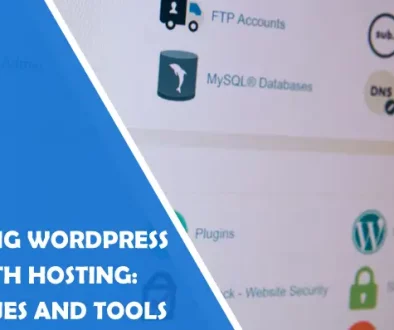Choosing the Right Web Host for Long-Term Business Success
A business’s online presence is more than just a marketing tool; it’s a cornerstone of customer engagement, brand reputation, and operational continuity. Whether you’re launching an e-commerce site, managing an online portfolio, or building a service-based platform, choosing the right web host is crucial. Your hosting provider doesn’t just store your website; it influences its speed, security, scalability, and performance.
Long-term success in the digital space begins with a solid foundation, and that foundation starts with reliable hosting. Selecting a hosting service isn’t a one-size-fits-all decision. It requires a clear understanding of your current business needs, your projected growth, and the types of traffic and data loads your website will be handling. Let’s explore what to look for in a web host, why it matters, and how the right choice can pay off for years to come.

Understanding Hosting Types and Your Business Model
Before comparing providers, it’s important to understand the various types of hosting and how they relate to your business goals. Shared hosting is ideal for small websites or startups that don’t require extensive resources. It’s cost-effective but comes with limitations in bandwidth and scalability.
VPS (Virtual Private Server) hosting provides more control and better performance, making it suitable for growing businesses that need customization and greater traffic handling. Dedicated hosting offers exclusive server resources, optimal for enterprise-level applications or businesses with high-security requirements. Then there’s cloud hosting, known for its scalability and resilience, perfect for businesses expecting fluctuating traffic or planning rapid growth. Consider Unlimited Web Hosting and similar providers when comparing features. The best hosting services offer tiered plans, letting you start small and scale as your business grows, without migration headaches or downtime risks.
Performance and Uptime
Website downtime can hurt your brand, frustrate users, and directly impact revenue for e-commerce businesses. Reliable hosting companies guarantee at least 99.9% uptime, often backed by SLAs (Service Level Agreements). The higher the uptime percentage, the less risk of customers being met with error pages or slow-loading content.
Page load speed is another critical factor. A delay of even a second can lead to increased bounce rates and lost conversions. Hosting providers should offer solid infrastructure, including SSD storage, CDN (Content Delivery Network) support, and load-balancing technologies to ensure optimal performance.
Your business may need data centers in specific geographic locations. Hosting providers with multiple global data centers can ensure faster content delivery to target audiences, no matter where they’re located.
Security Measures and Data Protection
Cybersecurity is non-negotiable in the modern business landscape. Hosting providers must offer multiple layers of security to protect your site from DDoS attacks, malware, and unauthorized access. Key features to look for include SSL certificates, firewalls, server monitoring, and automated backups.
Daily or weekly backups, along with one-click restore functionality, can make the difference between a temporary hiccup and a catastrophic data loss. Managed hosting services often take security one step further by handling patch updates, plugin vulnerabilities, and proactive threat detection on your behalf.
Make sure your web host complies with relevant industry regulations if your site handles sensitive data or user information. This includes GDPR, PCI-DSS, and other regional privacy laws that affect e-commerce and SaaS platforms.
Scalability and Future-Proofing
Your web hosting decision should reflect your current needs and where your business is heading. As traffic grows, you’ll need more bandwidth, processing power, and storage. A good web host allows seamless upgrading without site migration or extended downtime.
Some hosts offer auto-scaling capabilities, which automatically adjust server resources based on real-time demand. This is useful during marketing campaigns or seasonal spikes in traffic. Look for providers that make plan upgrades simple and affordable.
Evaluate whether the hosting company provides tools for business integration, such as compatibility with CMS platforms like WordPress, WooCommerce, or Magento, and access to developer tools, APIs, or staging environments.
Customer Support and Service Availability
Even with the best infrastructure, technical issues may arise. When they do, fast and effective support is crucial. Choose a web hosting provider that offers 24/7 customer support via multiple channels, chat, phone, and email. Some include ticket-based systems with guaranteed response times.
Read reviews and test their response time before committing. The quality of support can often be the difference between an issue that’s resolved in minutes and one that drags on for days.
Many top-tier hosting providers offer managed support tiers where technicians handle performance tuning, backups, and plugin updates. This is useful for small businesses that don’t have an in-house IT team.
Cost vs. Value
Cost is often the first thing business owners look at, but price alone shouldn’t dictate your choice. A low-cost hosting plan might be appealing, but it often lacks features like security, backups, or speed optimization.
Compare what’s included in each plan. Are there extra charges for SSL certificates, email hosting, or technical support? Is the pricing transparent, or does the low introductory rate spike after the first year? Factor in these hidden costs when determining the actual value.
Quality hosting should be seen as an investment, not a liability. Paying a little more for better performance, scalability, and support can save you far more in lost sales, downtime, or cyber incidents in the long run.
User Interface and Ease of Management
For business owners managing their own websites, a user-friendly control panel is crucial. Platforms like cPanel or Plesk provide an intuitive dashboard for managing domains, databases, files, and email accounts without needing a developer.
If you’re new to web hosting, make sure the provider offers onboarding assistance, tutorials, or even automated tools to guide you through setting up your website. Time saved in configuration and troubleshooting is time you can spend growing your business.
For businesses with more advanced needs, ensure the host allows SSH access, database management, and version control integration. Flexibility is key to accommodating both beginners and seasoned developers alike.
Additional Features to Consider
Some hosts offer value-added services that can enhance your website management experience. These might include built-in SEO tools, one-click app installations, free migration services, or email marketing integrations.
If email hosting is important, make sure the provider offers secure, reliable email services with spam protection and ample storage. E-commerce businesses should verify support for payment integrations, security standards, and performance optimization.
It’s worth exploring customer loyalty benefits. Some hosts offer discounts for annual renewals, referral programs, or cloud credit incentives that can further reduce your total cost of ownership.

As your business evolves, so should your hosting capabilities. Prioritize providers that offer a flexible path for growth, transparent pricing, and comprehensive features that align with your unique goals. In doing so, you not only ensure your website stays online, you build a foundation for sustained digital success.
- What Most First-Time Site Owners Overlook Before Launching Online - November 21, 2025
- THE.Hosting Review 2025: Honest Experience with VPS & Hosting Services - September 24, 2025
- TOP 5 e-scooter apps developers 2025 - September 19, 2025
Where Should We Send
Your WordPress Deals & Discounts?
Subscribe to Our Newsletter and Get Your First Deal Delivered Instant to Your Email Inbox.



